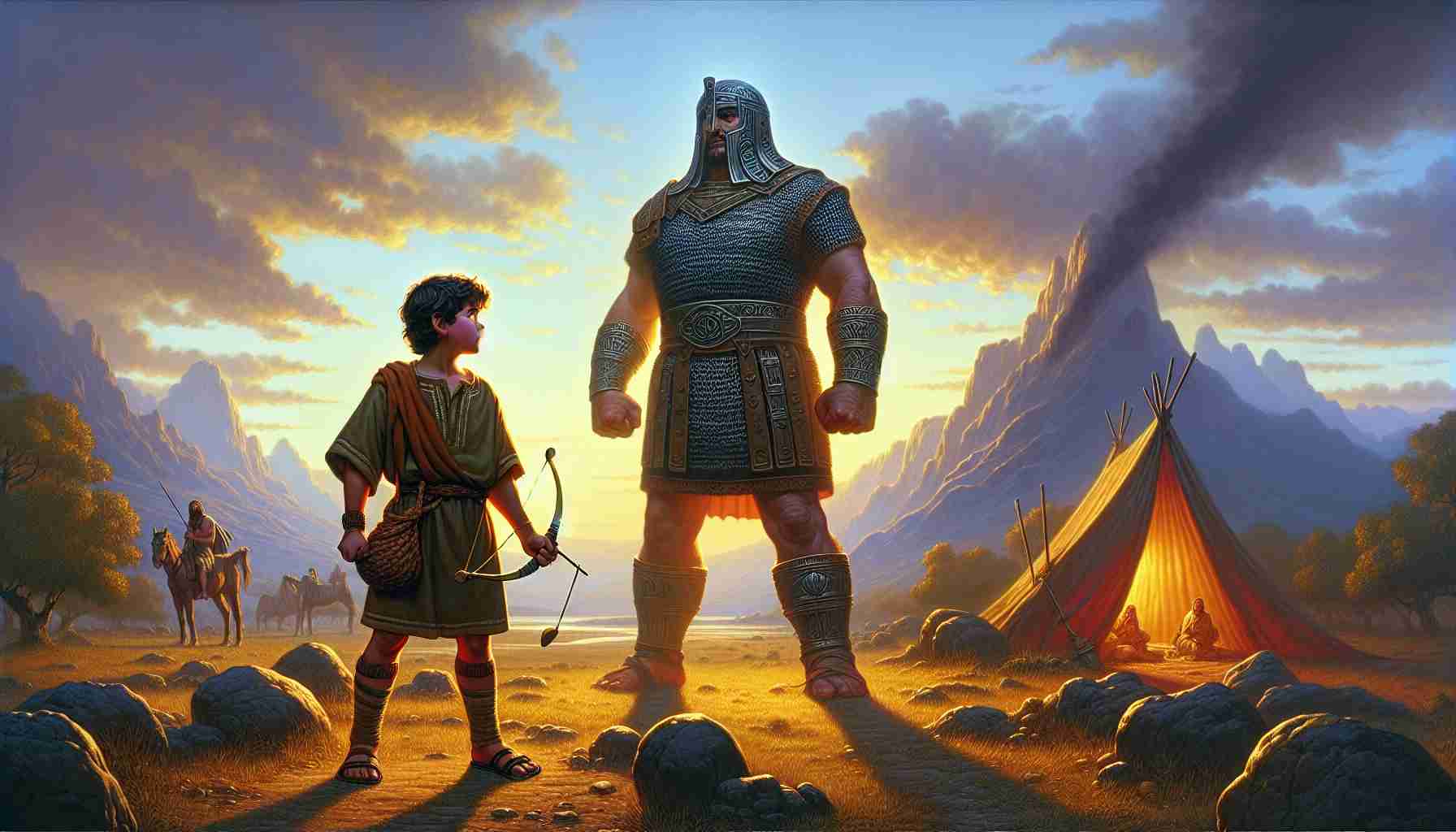

I tightened the straps on King Shaul’s armor with shaking hands. I wasn’t a soldier—just a servant boy from Beit Lechem who’d come to bring bread to my brothers. I never thought I’d end up standing on the edge of a battlefield, watching my cousin walk toward a giant.
David had only just arrived when I brought him water. I thought he was there to check on his brothers, like me. He was the youngest son of Yishai, known in our village more for his music than his muscles. He still had calluses from his harp and dust on his sandals from the sheep fields.
None of us saw it coming.
For forty days, Golyat had shouted across the valley. He was taller than any man I’d ever seen, his armor thick like iron gates. Every morning he came down to mock us—daring someone to fight. But no one moved. Not even King Shaul.
Then David stepped forward.
“I’ve killed lions and bears to protect my sheep,” he said to the king. “Hashem saved me then. He’ll save me now.”
Shaul didn’t say much. Just looked at him. Maybe he didn’t believe David could win. But I think he saw that David already believed it himself.
They handed him the king’s own armor. I helped him with the straps. He tried walking, then shook his head.
“I can’t wear this,” he said. “It’s not mine.”
So he left it behind. No helmet. No sword. Just his staff, a sling, and five smooth stones he picked from a stream.
I watched from the ridge, clutching my bread sack tight.
Golyat laughed when he saw him. “Am I a dog?” he roared. “You send a boy with sticks?”
David didn’t flinch. “You come with sword and spear,” he shouted back, “but I come in the name of Hashem, the God of Israel.”
I whispered a prayer. Not a loud one. Just a breath.
Then David ran. Fast, like he was chasing something off. The sling spun once—twice—and the stone flew.
Golyat dropped like a falling wall.
There was silence. Then shouting. Then chaos. The Philistines ran. We chased them. It was over before it felt real.
I didn’t become a soldier that day. But I saw what courage looked like. Not the kind that comes from armor or height—but the kind that comes when someone trusts Hashem more than they trust their fear.
David didn’t just win a fight. He reminded us that sometimes, one brave voice is enough to wake everyone else up.
I tightened the straps on King Shaul’s armor with shaking hands. I wasn’t a soldier—just a servant boy from Beit Lechem who’d come to bring bread to my brothers. I never thought I’d end up standing on the edge of a battlefield, watching my cousin walk toward a giant.
David had only just arrived when I brought him water. I thought he was there to check on his brothers, like me. He was the youngest son of Yishai, known in our village more for his music than his muscles. He still had calluses from his harp and dust on his sandals from the sheep fields.
None of us saw it coming.
For forty days, Golyat had shouted across the valley. He was taller than any man I’d ever seen, his armor thick like iron gates. Every morning he came down to mock us—daring someone to fight. But no one moved. Not even King Shaul.
Then David stepped forward.
“I’ve killed lions and bears to protect my sheep,” he said to the king. “Hashem saved me then. He’ll save me now.”
Shaul didn’t say much. Just looked at him. Maybe he didn’t believe David could win. But I think he saw that David already believed it himself.
They handed him the king’s own armor. I helped him with the straps. He tried walking, then shook his head.
“I can’t wear this,” he said. “It’s not mine.”
So he left it behind. No helmet. No sword. Just his staff, a sling, and five smooth stones he picked from a stream.
I watched from the ridge, clutching my bread sack tight.
Golyat laughed when he saw him. “Am I a dog?” he roared. “You send a boy with sticks?”
David didn’t flinch. “You come with sword and spear,” he shouted back, “but I come in the name of Hashem, the God of Israel.”
I whispered a prayer. Not a loud one. Just a breath.
Then David ran. Fast, like he was chasing something off. The sling spun once—twice—and the stone flew.
Golyat dropped like a falling wall.
There was silence. Then shouting. Then chaos. The Philistines ran. We chased them. It was over before it felt real.
I didn’t become a soldier that day. But I saw what courage looked like. Not the kind that comes from armor or height—but the kind that comes when someone trusts Hashem more than they trust their fear.
David didn’t just win a fight. He reminded us that sometimes, one brave voice is enough to wake everyone else up.